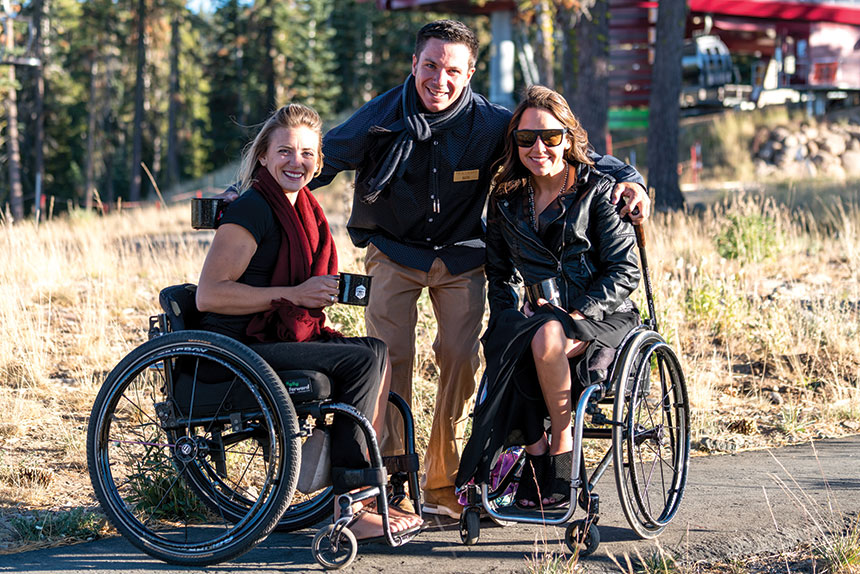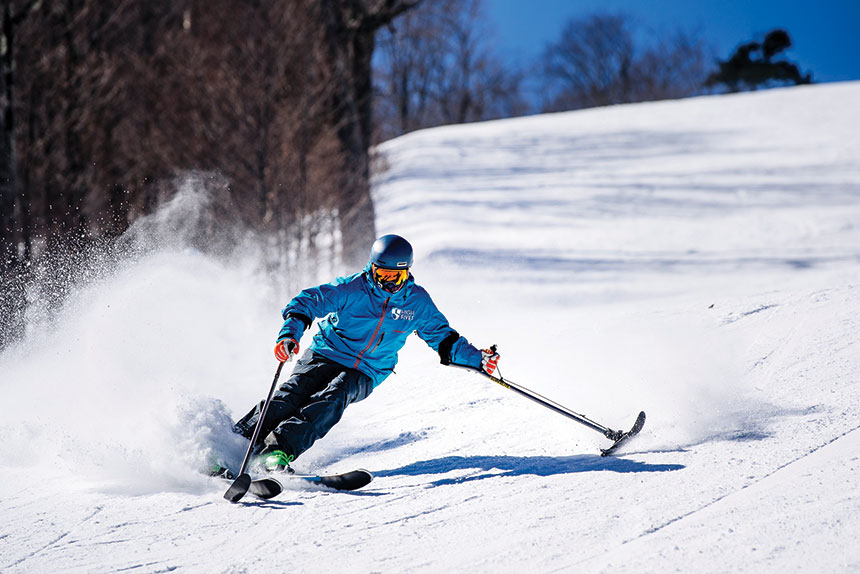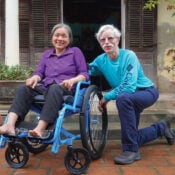Roy Tuscany lay in the snow at the Mammoth Mountain ski resort in California, paralyzed below the waist, screaming in pain. He had skied too fast on a step-up jump (a jump where the landing point is higher than the takeoff point) and soared 130 feet, falling on his back and fracturing his T12 vertebra. Tuscany was no out-of-control amateur — in 2006, when the accident occurred, he was a 24-year-old professional skier and ski coach, and two weeks earlier he’d easily managed the jump. But this time was different. He was using new skis and the snow was harder, increasing his speed.
“Instead of taking any of that into consideration, I just thought, ‘Oh, I know what I’m doing,’” he says. “And I went too fast.”
Adding to the emergency: Tuscany wasn’t wearing gloves, and he nicked an artery in his right thumb, reddening the snow with blood. Despite the trauma, he found his phone and called a friend, asking him to notify the ski patrol. Then he blacked out.
“The next thing I remember is an air mask on my face and all these people around me looking as if they had just seen a puppy get hit by a truck,” he says.
The accident transformed Tuscany’s life — physically, emotionally, professionally. After enduring a grueling recovery and regaining the use of his legs, he founded the Truckee, California-based High Fives Foundation in 2009 to help athletes, veterans, and everyday people recover from life-altering injuries and return to sports such as skiing, biking, and surfing. Over the past 13 years, the foundation has supported nearly 500 people, and for those recovering in the Reno-Tahoe region, Tuscany himself often visits. The foundation’s policy: If anyone enters the Renown Regional Medical Center in Reno with a spinal cord injury, someone from High Fives will be at their bedside within 48 hours to share resources, help them navigate questions, and offer support.
“That’s what makes Roy special: He goes into the hospital, into the ICU, and he lifts up people that have had these hard experiences,” says Becca Lefanowicz, director of fundraising and media with the foundation, which was named a 2021 nonprofit of the year by the California assembly. “He tells them, ‘Hey, life might not be the same, but it can still be awesome.’”
Growing up in Waterbury, Vermont, Tuscany start skiing at an early age. When he was in third grade, his mom told him that he needed to play a winter sport, so he joined the after-school program at the Bolton Valley ski area.
“We’d go up every Wednesday and get rental skis and ski under the lights,” he says. It was love at first swoosh, and after graduating from college, he moved west and became a coach at the Sugar Bowl Resort in California while training for a career as a terrain-park skier. The accident ended those dreams, and he endured complications from his injury as well as depression. Three nights after the crash, in agonizing pain, unable to sleep, Tuscany told his mom, “I just want to die.”
“I didn’t raise a son to say those words,” she said. “Don’t you ever say those words again.”
His mother’s strength and unconditional love helped spur his recovery, and other key figures also provided support. His physical therapist, Ladd Williams, worked with him for two years, six hours a day. When Tuscany briefly quit therapy and started drinking, his friend Wayne Burwell, a trainer in New Hampshire, arrived in California to help.
“He made sure that I knew I was worthy, and that I was loved, but more importantly he trained me every day at this gym, and we worked on this stuff together,” he says. “If I didn’t find those two folks, I don’t know what life would look like because they showed me that with care, my body could respond and my mind could respond.”
Tuscany used a wheelchair the first year after his accident but soon learned to walk again. “I can’t walk up stairs without a handrail, but I can walk,” he says. “It’s not pretty, but I can walk.”
He also received financial support during his recovery from friends, family, and his ski sponsors, which helped pay for therapies not covered by insurance. The Sugar Bowl Academy, a California nonprofit that supports skiers who are student athletes, created Roy’s Recovery Fund to help with his bills, and Tuscany quickly wondered if he could help others who needed similar assistance.
“For two years, I was able to focus on my recovery,” he says. “But what if other people didn’t have the community like I did to help them through the recovery process? There’s only one way to really say thank you, and that’s to pay it forward, and do what they did for me. That was the catalyst for the foundation.”

High Fives provides money for everything from therapy to expensive adaptive sports equipment. Recipients include a man in Colorado who became paralyzed from the waist down after a mountain bike crash; the foundation provided $5,000 for adaptive exercise sessions. After a 15-year-old girl in Idaho suffered a spinal cord injury from a car accident, High Fives donated $4,500 toward a hand-controlled recumbent bike. The foundation also runs a safety education campaign to reduce winter sports injuries and supports alternative treatments for injuries.
“Spinal cord injuries are like snowflakes: Every single one is different,” Tuscany says. “There’s no clear path to what recovery looks like, so we believe in helping fund alternative healing concepts. I’m a big believer in acupuncture. I’m a big believer in specialty massage. I’m a big believer in high-intensity, repetitive-motion workouts. There are a lot of different stories of what’s worked and what hasn’t, but we want people to be open to trying new ways of healing.”
Tuscany is proof that people can recover. Fifteen years after his accident, he skis with his two-year-old son, though he prefers water sports, which are less painful on his battered body. He particularly enjoys an adaptive surfboard called a wave ski, which you sit on rather than stand. In December 2021, Tuscany was in Maui hosting a High Fives adaptive surfing camp for 15 people with life-changing injuries, and he surfed on a wave ski with a man named Hamilton Coke. Three years earlier, Coke had a suffered a spinal cord injury while skiing near Lake Tahoe.
“When I met him, he couldn’t move anything below his nose,” Tuscany says. “I looked him in the eye and said, ‘We will participate in sports together again.’ He’s 98 percent healed, and he’s got a lot of balance issues now, but if you just saw him standing, you wouldn’t have a clue that anything was up.”
Sports are important for recovery. They provide a goal. They boost confidence. They help people to reconnect with the world and build an identity beyond their disability. That’s why High Fives calls all of its grant recipients “athletes.”
“I could call you a grantee recipient or an awardee, but that has no meaning,” says Tuscany. “But when someone says ‘I’m an athlete,’ their chest puffs up.”
Ken Budd has written for The Atlantic, The New York Times, The Washington Post, and many more. He is the author of the memoir The Voluntourist.
This article is featured in the May/June 2022 issue of The Saturday Evening Post. Subscribe to the magazine for more art, inspiring stories, fiction, humor, and features from our archives.
Featured image: Ticket to slide: Roy Tuscany hits the slopes thanks to custom ski poles. (Photo courtesy of Roy Tuscany)
Become a Saturday Evening Post member and enjoy unlimited access. Subscribe now




Comments
A very inspiring story about overcoming what seem to be insurmountable odds with the right therapies, people, encouragement and sheer determination. I’m also a big believer in acupuncture and alternative healing whenever possible. It’s so wonderful how Roy visits people that have sustained serious injuries to give them help and hope!